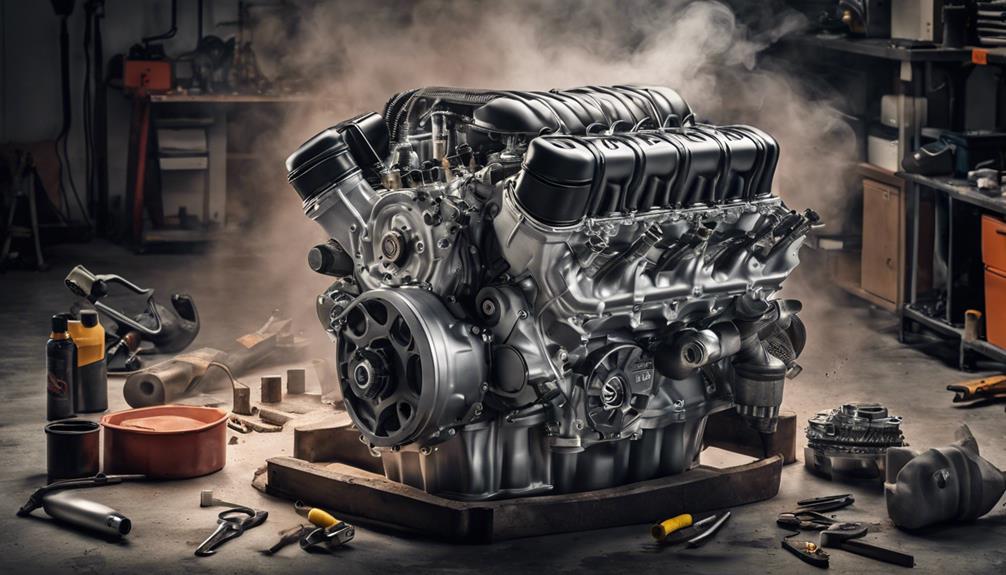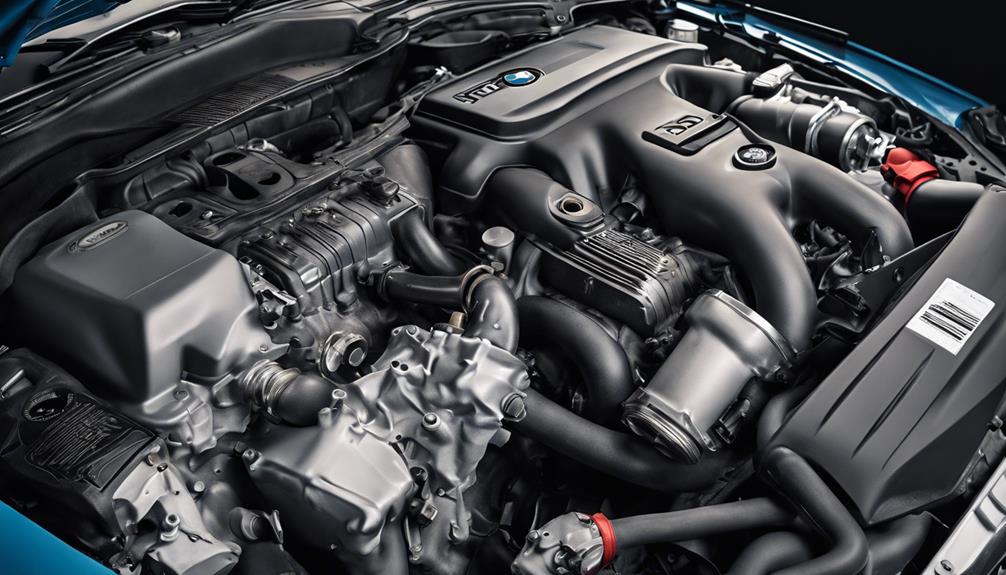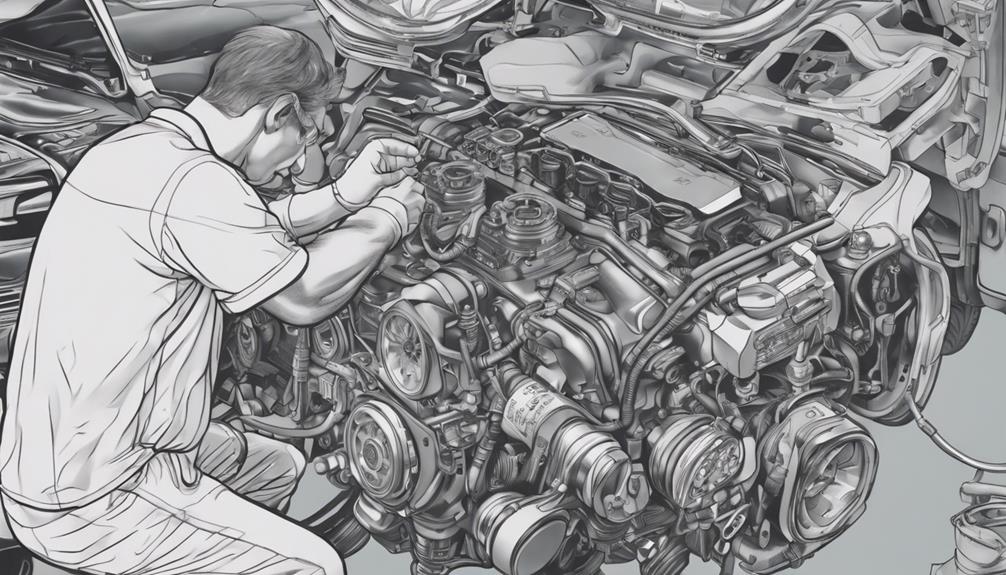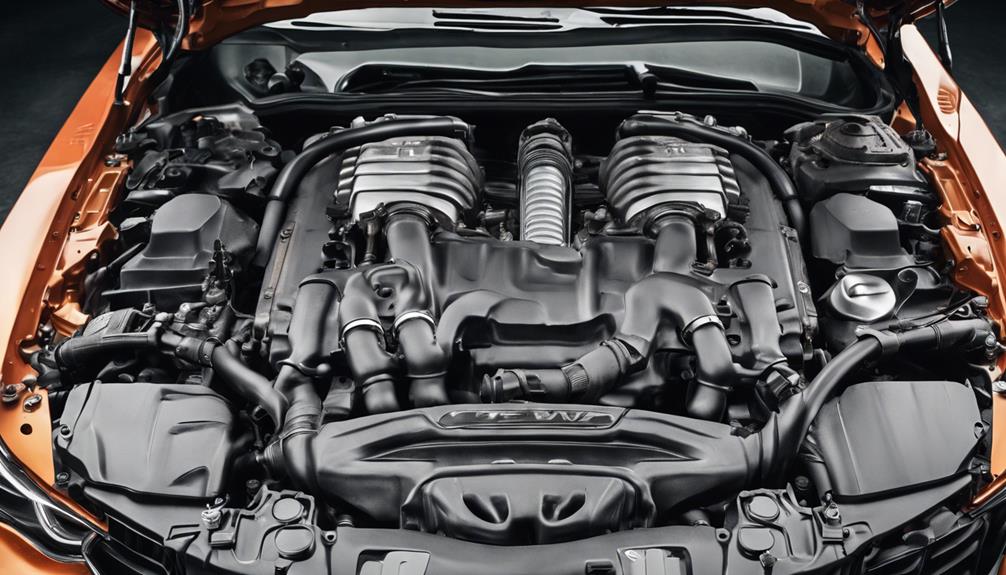If you own a BMW M8, be vigilant for potential recalls concerning window and sunroof issues and repair problems like engine overheating that can impact your car's performance. Being proactive about these issues will guarantee your vehicle stays in top shape. Factors such as repair costs, maintenance needs, and warranty coverage play vital roles in keeping your BMW M8 running smoothly. Discover more tips to enhance your BMW M8 ownership experience.
Key Takeaways
- Recalls for windows and sunroofs operating without key present.
- Engine overheating and electronic system malfunctions impact performance.
- Repair costs influenced by damage extent, parts, labor rates, and location.
- Average repair time of 2 to 3 days due to complex systems.
- Regular maintenance every 10,000 to 15,000 miles crucial for peak performance.
Recalls Related to Windows and Sunroofs

If you own a 2023 BMW M8, be aware of an important recall concerning the windows and sunroof functionality. This issue may seem minor, but it can have long-term implications for the security of your vehicle.
The recall specifically addresses the potential for windows and sunroofs to operate without the key present, which could lead to unauthorized access to your prized BMW M8.
Ensuring that this recall is promptly addressed is vital for maintaining the safety and security of your vehicle. By contacting your dealership and scheduling the necessary service, you can prevent any potential risks associated with the windows and sunroof functionality.
Taking proactive steps to safeguard your BMW M8 and address any potential vulnerabilities that could compromise its security in the long run is important.
Repair Issues Impacting Vehicle Performance
If you've observed engine overheating issues or encountered electronic system malfunctions in your BMW M8, you're not alone.
These problems can greatly affect your vehicle's performance and overall driving experience.
Addressing these repair concerns promptly is vital to make certain your M8 maintains its high-performance standards.
Engine Overheating Problems
Experiencing engine overheating in your BMW M8 can significantly impact its performance and lead to costly repair issues if not addressed promptly. This issue often stems from cooling system failures like a malfunctioning thermostat or water pump. Symptoms such as a rapidly rising temperature gauge, coolant leaks, and steam emanating from the engine bay indicate overheating.
Neglecting these signs can result in severe engine damage like warped cylinder heads, blown head gaskets, or even complete engine failure. To prevent engine overheating, make sure to perform regular maintenance and swift repairs of cooling system components. Monitor coolant levels, inspect for leaks, and promptly address any warning signs to steer clear of engine overheating woes in your BMW M8.
Electronic System Malfunctions
Dealing with electronic system malfunctions in your BMW M8 can greatly impact the vehicle's performance and safety, requiring prompt attention to guarantee peak functionality.
From iDrive system glitches to sensor failures causing inaccurate warnings, these issues can hamper your driving experience.
Wiring harness malfunctions may lead to electrical failures, affecting critical components like lights and windows.
Additionally, software bugs can disrupt features such as navigation and driver assist systems, compromising your overall driving comfort.
Addressing these malfunctions swiftly is crucial to make certain your BMW M8 operates at its best.
Stay ahead of these electronic gremlins to enjoy a seamless and safe driving experience in your high-performance vehicle.
Factors Affecting Repair Costs

Repair costs for the BMW M8 are greatly influenced by a multitude of factors, including the extent of damage, required parts, labor rates, and the vehicle's location. Here's a breakdown to help you understand how these factors can affect your wallet:
- Extent of Damage: The more extensive the damage, the higher the repair costs are likely to be. From minor scratches to major engine issues, the level of damage directly impacts the final bill.
- Required Parts: Genuine BMW parts don't come cheap. Depending on what components need replacing, the cost can vary significantly. Factor in the M8's high-performance nature, and you might be looking at premium-priced parts.
- Labor Rates: Skilled technicians familiar with the complexities of the M8 demand higher labor rates. The expertise required for these repairs can drive up the overall cost.
- Vehicle's Location: Repair costs can differ based on where you are. Urban areas with higher living costs and luxury car demand may have pricier repair services compared to rural locations.
Considering these factors can help you anticipate and manage potential repair costs for your BMW M8.
Average Repair Time Concerns
Concerns surrounding the average repair time for common BMW M8 issues often revolve around the complexity of the car's systems and components. The intricate nature of the M8 can lead to repairs taking around 2 to 3 days on average. Due to the sophisticated technology and design of the M8, some fixes might require more time.
Factors like parts availability and the expertise of the technician can also impact repair duration. It's worth noting that BMW-certified technicians familiar with the M8's intricacies may expedite certain repairs. Quick and accurate diagnosis, coupled with efficient repair procedures, can help minimize the overall repair time for BMW M8 issues.
Frequency of Maintenance Needed

Regular maintenance for your BMW M8 becomes essential every 10,000 to 15,000 miles to guarantee peak performance and longevity. To keep your M8 running smoothly, here are some key maintenance tasks to contemplate:
- Oil Changes: Ensuring your M8 has fresh oil at the recommended intervals keeps the engine running smoothly and efficiently.
- Filter Replacements: Regularly changing filters like air and fuel filters helps maintain ideal engine performance and fuel efficiency.
- Brake Inspections: Checking the brakes regularly is important for safety and ensures they function correctly when you need them most.
- Fluid Top-ups: Monitoring and topping up essential fluids such as coolant, brake fluid, and transmission fluid is crucial to prevent potential issues and keep your M8 in top condition.
Prompt Addressing of Repair Issues
When addressing repair issues promptly in your BMW M8, you enhance its performance and safeguard against potential safety risks. Neglecting to address these problems can't only lead to more extensive damage but also compromise the overall driving experience. By swiftly dealing with common issues, you guarantee that your BMW M8 remains in top condition, providing you with maximum satisfaction on the road.
Failure to promptly address repair concerns can result in decreased performance and potential safety hazards, impacting both the health and longevity of your BMW M8. Quick resolution of these issues is key to maintaining the reliability and resale value of your vehicle. Regular maintenance coupled with timely repairs contribute significantly to your BMW M8's overall well-being, ensuring a smooth driving experience and peace of mind. So, don't delay – address those repair issues promptly to keep your BMW M8 running smoothly and safely.
Importance of Regular Servicing

Maintaining a consistent schedule of service appointments is vital for optimizing the performance and longevity of your BMW M8. Here are four key reasons why regular servicing is essential:
- Preventing Issues: Scheduled maintenance helps catch potential problems early, preventing them from escalating and ensuring your M8 runs smoothly.
- Optimal Functioning: Following the manufacturer's recommended service intervals keeps all components working together harmoniously, enhancing the overall performance of your vehicle.
- Cost-Effective: Regular servicing may seem like an added expense, but it can actually save you money in the long run by preventing more significant and costly repairs.
- Comprehensive Care: Routine servicing involves essential tasks like oil changes, filter replacements, and thorough inspections, providing your M8 with the care it needs to stay in prime condition.
Neglecting these service appointments could result in decreased fuel efficiency, diminished performance, and even unexpected breakdowns. Stay ahead of the game by prioritizing regular servicing to keep your BMW M8 running at its best.
Ensuring Longevity and Optimal Performance
To ensure the BMW M8's longevity and peak performance, meticulous attention to maintenance tasks and proactive care is essential. Regular servicing following BMW's maintenance schedule isn't just a suggestion; it's a lifeline for your M8.
By keeping an eye on tire pressure, alignment, and tread depth, you're not just ensuring a smoother ride but also extending the lifespan of your tires. Fluids like oil, coolant, and brake fluid are the lifeblood of your M8 – changing them at the recommended intervals can prevent costly engine and component damage.
Don't ignore warning lights or unusual noises; they could be early indicators of potential issues. Stay ahead by inspecting brakes, suspension components, and drivetrain regularly to catch wear and tear before it becomes a major headache.
Your M8 is a precision machine – treat it with care, and it will reward you with unparalleled performance and longevity.
Warranty Coverage Details for Owners
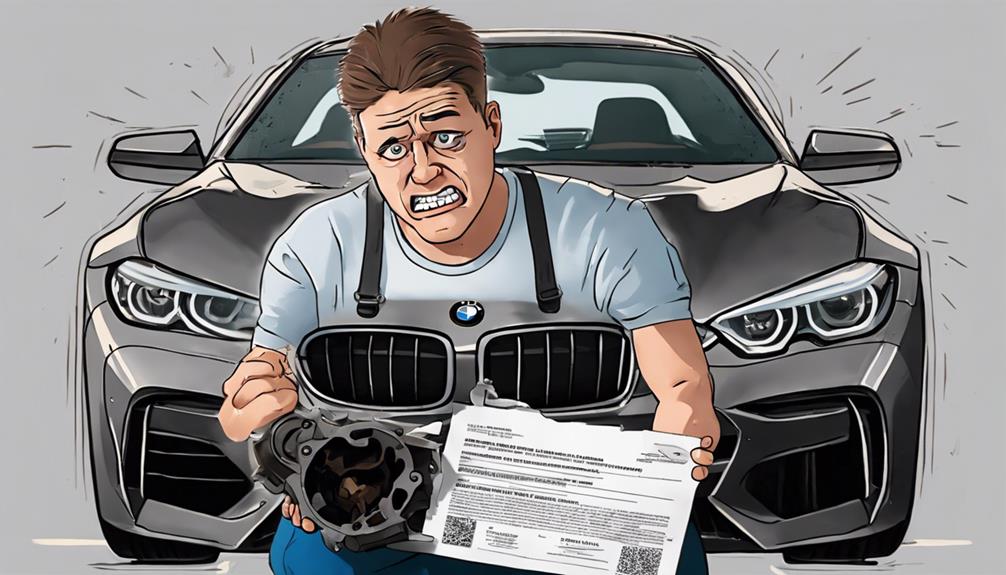
Traversing the complexities of warranty coverage for your 2023 BMW M8 demands a sharp understanding of the protection and benefits afforded to owners. Here's a breakdown to guide you through the warranty details:
- Duration: Your 2023 BMW M8 is covered by a warranty typically lasting 4 years or up to 50,000 miles, whichever milestone you hit first.
- Covered Components: Enjoy peace of mind knowing that the warranty includes protection for critical parts like the engine, transmission, drivetrain, and other major vehicle components.
- Scheduled Maintenance: Take advantage of complimentary scheduled maintenance services that are often included during the warranty period, ensuring your M8 stays in top shape.
- Variances: Keep in mind that the specifics of your warranty coverage may vary depending on the terms set by BMW and any additional extended warranty options you've chosen.
DIY Maintenance Tips for BMW M8
You can begin by making sure you change your BMW M8's oil at the recommended frequency, keeping the engine running smoothly.
Regularly checking tire pressure can help maintain peak handling and safety while extending the life of your tires.
Don't forget to inspect your brake pads for wear and tear to ensure efficient braking performance on your BMW M8.
Oil Change Frequency
Maintaining proper oil change intervals for your BMW M8 is crucial for sustaining its performance and longevity. Here are four key points to keep in mind when it comes to oil changes:
- Timing is Everything: Aim for an oil change every 10,000 to 15,000 miles to keep your BMW M8 running smoothly.
- Quality Matters: Stick to the manufacturer-recommended oil grade and quality to ensure peak engine function.
- DIY Confidence: With the right tools and following the owner's manual, you can confidently perform oil changes yourself.
- Avoid Regrets: Neglecting oil changes could lead to engine wear, decreased performance, and potential mechanical issues down the road. Stay proactive to enjoy your BMW M8 to the fullest!
Tire Pressure Check
Regularly monitoring the tire pressure of your BMW M8 is a fundamental aspect of DIY maintenance to uphold its peak performance and safety standards. Incorrect tire pressure can result in decreased fuel efficiency and uneven tire wear, compromising your driving experience.
To guarantee you're on the right track, locate the recommended tire pressure for your BMW M8 in the owner's manual or on a sticker inside the driver's door. Invest in a reliable tire pressure gauge to accurately measure the pressure of each tire.
Brake Pad Inspection
To effectively maintain peak braking performance in your BMW M8, conducting regular inspections of the brake pads is crucial. Here are four key steps to guarantee your brake pads are in top condition:
- Visual Inspection: Check for uneven wear or thinning pads that may indicate a need for replacement.
- Listen Closely: Pay attention for any unusual noises like squealing or grinding when applying the brakes.
- Measure Thickness: Use a caliper to measure the thickness of the brake pads; if they're below the manufacturer's recommended minimum, it's time for new ones.
- Follow Maintenance Schedule: Adhere to BMW's recommended maintenance schedule for brake pad inspections to prolong the lifespan of your braking system.
Regular DIY brake pad inspections won't only save you money but also ensure your BMW M8's safety on the road.
Manufacturers Maintenance Schedule Adherence
Adhering meticulously to the manufacturer's maintenance schedule for your BMW M8 is the cornerstone of ensuring peak performance and longevity for your luxury vehicle. By following the recommended intervals for services like oil changes, filter replacements, and inspections, you're not just ticking off boxes; you're actively safeguarding your investment. Neglecting these schedules could result in voided warranties, decreased resale value, and potential mechanical headaches that could have been easily prevented. Think of it as giving your M8 the VIP treatment it deserves.
Regular maintenance isn't just about following rules; it's about staying ahead of any issues that could snowball into major problems. Early detection leads to timely repairs, saving you from costly breakdowns and keeping your driving experience smooth. So, embrace the maintenance schedule, show your M8 some love, and enjoy the confidence of knowing you're taking all the right steps to protect your prized possession.
Key Aspects for BMW M8 Owners

As a BMW M8 owner, you should explore performance upgrades to enhance your driving experience. Regular maintenance checks and tips can help you keep your BMW M8 running smoothly.
Embracing these key aspects guarantees you get the most out of your luxury vehicle.
Performance Upgrades
Boosting your BMW M8's performance to over 800 hp through various upgrades isn't just a dream but a tangible reality for owners seeking enhanced driving dynamics. Here are some key upgrades to take your M8 to the next level:
- ECU Tuning: Unlock hidden power by optimizing engine performance.
- Upgraded Exhaust System: Enhance both the sound and power output of your M8.
- Performance Air Filters: Improve airflow for increased horsepower and torque.
- Larger Intercoolers: Keep temperatures down for consistent power delivery.
With these upgrades, you can transform your BMW M8 into a high-performance machine that not only looks stunning but also delivers an exhilarating driving experience.
Maintenance Tips
To guarantee your BMW M8 continues to perform at its peak and remains in top condition, prioritizing key maintenance aspects is essential for every owner.
Regularly checking and maintaining proper fluid levels, following the manufacturer's recommended service schedule, and keeping tires inflated with proper tread depth are vital steps.
Cleaning your BMW M8 inside and out not only preserves its aesthetic appeal but also safeguards it from damage.
Additionally, tackling DIY maintenance tasks can prevent common issues and guarantee smooth operations.
Frequently Asked Questions
Are BMW M8s Reliable?
Yes, BMW M8s may encounter reliability issues due to their advanced technology and performance features. Regular maintenance and prompt issue resolution are essential for ensuring the dependability of your BMW M8 in the long run.
Are BMW 8 Series Reliable?
When it comes to the reliability of BMW 8 Series, it's important to stay informed about potential issues like electrical faults and software glitches. Regular maintenance and prompt attention to any warning signs can help you navigate any challenges smoothly.
What Is Special About the M8?
In the BMW M8, you'll find a potent 4.4-liter V8 engine churning out 617 hp, propelling you from 0-62 mph in a mere 3.2 seconds. With customizable all-wheel drive options and a sleek, luxurious design, the M8 offers a thrilling driving experience.
How Many Mph Can a BMW M8 Go?
You can push the BMW M8 to a top speed of 155 mph unless you opt for the M Driver's Package, then you can hit 190 mph. The Competition model matches that speed, delivering an exhilarating driving experience.
Conclusion
To sum up, owning a BMW M8 comes with its fair share of common problems, from recalls related to windows and sunroofs to repair issues impacting vehicle performance. Understanding factors affecting repair costs and average repair time, as well as the frequency of maintenance needed, can help BMW M8 owners stay on top of their vehicle's maintenance.
By following DIY maintenance tips, adhering to the manufacturer's maintenance schedule, and being aware of warranty coverage details, BMW M8 owners can guarantee their luxury vehicle stays in top condition.






